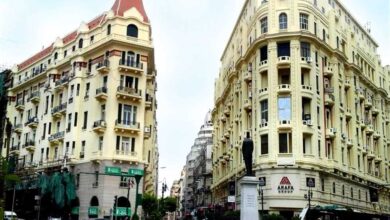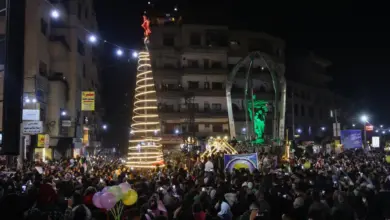Beds, drips and blankets are neatly stored away on one side of Qasr al-Dobara Church’s courtyard, just in case.
During the repeated clashes of 2011, and the most recent violence near the Interior Ministry at the start of February, the courtyard was transformed into a makeshift hospital. A streamlined triage system was set up, overseen by the indomitable Eva Botros, head of the church’s team of volunteers and its Love Outreach Ministry.
Amid the chaos of the fighting — which occasionally reached the church’s gates — and the stream of injuries rushing in, Botros firmly directed each wounded to one of the beds via microphone, occasionally against a background of hymns piped out from the church.
The Evangelical Qasr al-Dobara Church is a stone’s throw from Tahrir Square. Like the Omar Makram Mosque around the corner, its proximity to the clashes made it a natural choice for use as a field hospital. But, media spokesman Maged Adel says, the decision to receive the wounded was not without its detractors within the church. In a way, the contention became symbolic of the changing dynamics of Egyptian churches’ relationship to the polity and its broader society.
Stepping outside the church
During the 18 days of the uprising in 2011 the Qasr al-Dobara Church’s role was limited to providing guidance to members of its congregation confused about “whether they should go to Tahrir or support Hosni Mubarak,” Adel says.
“There was debate about whether Christianity allows us to stand up to our rulers. We lost some of our people because they felt that Christians should be quiet. We cannot direct them, so we did our best to guide them through biblical values of defending the weak and standing up to corruption,” he continues.
Some of the congregation decided to support the embattled president, and others took to the square.
Church and politics should be “firmly separated,” Adel maintains, and the church “should not play any role in political issues.”
Nevertheless, Adel sees that the revolution inscribed a societal opening of the church, which has been missing.
The revolution “broke down the barriers” between the church and the outside world, he says. “There is a separation between church and society, and after the revolution this fell down. It encouraged activity outside the church’s walls, encouraged Christians to put their feet outside the church.”
The church set up a small field hospital during the first Mohamed Mahmoud Street clashes in June. The decision to open the field hospital was supported by most members of the church board, Adel says, but was contentious both because of the possibility that it would be viewed as a form of political engagement and because of the physical danger that opening church’s doors risked.
“We decided that we needed to help — we have a safe, clean place and volunteers. This was a humanitarian and not a political act, it was a ministry of mercy that we provided for anyone who came to us — revolutionaries, army or police,” Adel said.
The church decided that it would “pay the cost” that placing itself “in the line of fire” meant. The field hospital’s team of 500 volunteers, used to organizing events for its congregation of 5,000, helped it tick along. Fifty people were on duty per shift assisting the doctors who volunteered to treat the wounded.
The year of 2011 ended with another unprecedented event for Qasr al-Dobara: After mass on New Year’s Eve, a procession headed out from the church to Tahrir Square, carrying candles and singing hymns. The event was particularly significant not only because it was a rare display of Christian festivities in a public space, but because it coincided with the first anniversary of the Qedeseen Church bombing in Alexandria, when 27 people were killed.
The Protestant-Coptic divide
The Qasr al-Dobara Church is part of the Evangelical movement founded by American Presbyterian missionaries in the 19th century. Protestant missionaries first arrived in Egypt in the 17th century, but it was not until the mid-19th century that their missionary work began in earnest.
Since 1854, missionaries from the West and the Levant arrived in Egypt in large numbers, where their mission focused primarily on education.
There are currently 14 Protestant denominations in Egypt, with the largest being the Evangelical Church of Egypt. According to some unofficial estimates, it has 250,000–300,000 members. Some of these members are drawn from disenchanted Coptic Orthodox Christians such as Mina Zekri, a physician and blogger who became Protestant in 1997.
Zekri — who served as a church deacon from the age of five in the Coptic Orthodox Church — heard an evangelical service at the Qasr al-Dobara Church, which he says touched him deeply.
“The point was no matter how long I knew ‘about’ God didn't mean that I did know God. In fact I began to see that it was my knowledge about God that kept me from ‘knowing him’ as a person. The whole Orthodox mission is focused on teaching the followers the Christian Orthodox doctrine, making them memorize the doctrines and keeping the traditions, without any focus on the faith dimension,” Zekri says.
“The impressive thing about the evangelical message for me at that time was freeing my mind and soul from the old-fashioned religious traditional way of thinking. It opened new horizons for me to think and rethink and question all the things I learnt to be the ‘truth’ since I was a child.”
The Protestant Church’s focus on faith, rather than ritual, is something that attracts “some spiritually-minded” Copts, says Jayson Casper, a researcher with the Arab West Report, a digest that translates Egyptian news stories and editorials addressing Muslim-Christian relations.
Evangelical Christianity affords its adherents a greater freedom in their spiritual life outside of the clerical hierarchy of the Orthodox Church and its strict mandates on the role of the priest as the intermediary in a devotee’s spiritual life.
A different function of the church in society
Zekri initially turned to Protestantism because he started to view the Orthodox Church as “too authoritative, empty and controlling,” in addition to being spiritually unsatisfying.
“Later on I began to get involved in politics and I began to see how corrupt the [Orthodox] Church system is in its interference with political affairs, and even worse supporting the regime,” Zekri says.
“The [Coptic] Church for a long, long time had some kind of a deal with the state. The deal is, ‘You give us civil authority over the Copts and in return we guarantee their loyalty to the regime — any regime.’ In having such a deal with the state, Copts literally turned into the ‘people of the church,’ a flock of sheep that the church is taking care of,” he goes on.
Many see the evolution of the church leadership over the Christian community as the product of an arrangement with the previous Mubarak regime that was conducive to the closure of the community into itself and its isolation from both society and politics.
But in addition to the opening that Qasr al-Dobara Church is making and the Protestant Church’s different approach, Zekri sees an overall change in the Christian community itself, especially among its youths.
“Even in the Orthodox churches, there is this new generation of ‘rebellious’ young people challenging the political authorities out there in the street and back there inside the church walls, like the young people in the cathedral last Christmas, shouting against the military while the late pope was thanking them and greeting them ‘passionately’ — this is a revolution in itself!” he exclaims.
Unity, perhaps?
This is perhaps prompting the Coptic Orthodox Church to revisit its stances.
There has also been a slight change in relations between the Coptic Orthodox and Protestant churches, with a joint prayer session held in the Saint Samaan Church in Manshiyet Nasser.
“It was a bit strange and out of context that the late Pope Shenouda welcomed that event, after demonizing similar events before and warning "his children" against participating in such events. Maybe it is a sign of a change? Maybe it is politics,” Zekri wonders.
Casper suggests that this unity is a natural reaction to the Islamist resurgence and that the church “can’t stand against the tide of a more inclusive Christianity. The trend is towards saying, ‘we’re all Christians.’”
Whether this could be a step in tandem with the new discourse — based on the notion that “we are all Egyptians” — is not yet clear.




